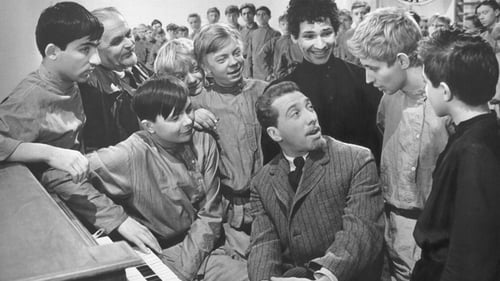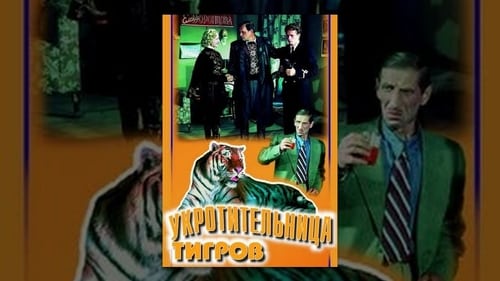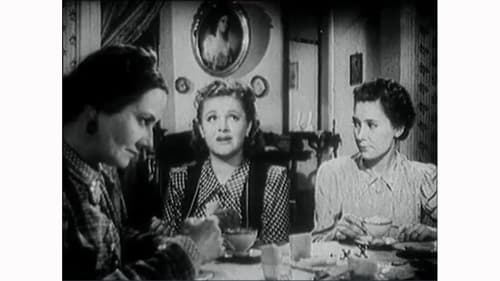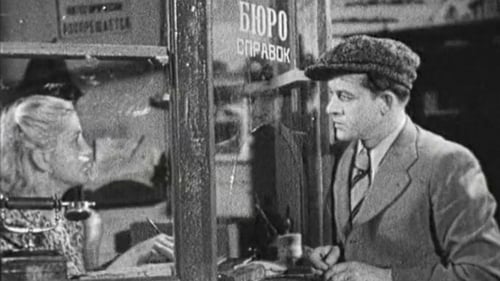Aleksandr Ivanovsky
Nacimiento : 1881-11-29, Kazan, Russian Empire
Muerte : 1968-01-12

Editor
The film is based on the eponymous book, written by two former street gangsters - Grigori Belykh and Leonid Panteleyev. Film is set in the 1920s St. Petersburg, Russia. Streets of the city are full of the homeless boys. They are caught to be raised and educated at the correction school named after Dostoevsky. The boys are street smart and difficult. But the faculty stands up to the challenge. The teaches are being devoted and caring, and gradually win the respect of the most difficult kids. The school director Vicknixor is a refined intellectual, who becomes a role model for the boys.

Director

Director
The story is about heiress of the circus family who organizes show "Let's get married" right in the cage for the tigers.

Writer

Director

Writer
Silva Varescu, a self-sufficient and professionally successful cabaret performer from Budapest, is about to embark on a tour of America. Three of her aristocratic admirers, named Edwin, Feri and Boni, prefer her to stay. Edwin, unaware that his parents have already arranged a marriage for him back home in Vienna, orders a notary to prepare a promissory note of his expected marriage to Silva within ten weeks.

Director
Silva Varescu, a self-sufficient and professionally successful cabaret performer from Budapest, is about to embark on a tour of America. Three of her aristocratic admirers, named Edwin, Feri and Boni, prefer her to stay. Edwin, unaware that his parents have already arranged a marriage for him back home in Vienna, orders a notary to prepare a promissory note of his expected marriage to Silva within ten weeks.

Director
Anton Ivanovich Voronov is a highly respected professor at the Moscow Conservatoire, who places the music of Bach above everything else and regards it as the ultimate yardstick by which other musical accomplishments must be measured. His daughter, Serafima, is an aspiring singer with great potential, and her father’s anger is aroused when she begins singing in the operetta composed by Aleksei Mukhin, thus abandoning what he considers the higher calling of opera. Mukhin’s work, however, demands a high level of ability from his soloist, and Anton Ivanovich is persuaded of the legitimacy of operetta as a musical genre when, in a dream, he is visited by Johann Sebastian Bach himself, who tells him that ‘people need all kinds of music’.

Director
Talented cabbie with aspirations as a singer spends afterhours practicing with an amateur opera company, ignoring his sweetheart, the femme cab dispatcher.

Writer
The eve of the 1905 Russian revolution was unquiet at the Skrobotova and Bardin factory. In response to the fair demand of the workers to dismiss the cruel and rude master, the masters close the factory and call in the troops. They shoot of one of the workers, who failed to restrain a rush of hatred towards the owners, ending Skrobotov's life. Gendarmes arrive at the factory. They succeed in uncovering the social democratic organization in the factory. The arrested workers oppose hysterical cruelty of gendarmes with calm, confident courage.

Director
The eve of the 1905 Russian revolution was unquiet at the Skrobotova and Bardin factory. In response to the fair demand of the workers to dismiss the cruel and rude master, the masters close the factory and call in the troops. They shoot of one of the workers, who failed to restrain a rush of hatred towards the owners, ending Skrobotov's life. Gendarmes arrive at the factory. They succeed in uncovering the social democratic organization in the factory. The arrested workers oppose hysterical cruelty of gendarmes with calm, confident courage.

Director
Peasant rebelling, pictures of folk anger - here accent that had to put Ivanovo in a new film. The manuscript of novel was found post mortem Pushkin in his papers. The name he did not have and remained unfinished. Intention of "Dubrovskiy" was prompted by an actual incident. A few variants of upshot of novel were saved. Ivanov became familiar with all and wrote it.

Writer
Peasant rebelling, pictures of folk anger - here accent that had to put Ivanovo in a new film. The manuscript of novel was found post mortem Pushkin in his papers. The name he did not have and remained unfinished. Intention of "Dubrovskiy" was prompted by an actual incident. A few variants of upshot of novel were saved. Ivanov became familiar with all and wrote it.

Writer
Film adaptation of The Golovlyov Family ("Господа Головлёвы), a classic novel by Mikhail Saltykov-Shchedrin. In the mid-19th century old-fashioned estate based on serfdom laws and traditions, tough and shrewd Arina Petrovna tries her best to make her realm prosper and even expand – despite unwillingness of her husband and three of her four children to lend helping hands... Ten years on, serfdom abolished, and now Porfiry-Yudishka, the epitome of a corrupt, cruel hypocrite, becomes the heir to the estate. Dullness and horrors of life, spent in destroying everybody around him, finally makes him to slowly realize things went somehow wrong. Half-mad, apparently, he goes to the cemetery to "ask for forgiveness" from his mother Arina Petrovna, and dies somewhere along his way, his frozen corpse found the next day.

Director
Film adaptation of The Golovlyov Family ("Господа Головлёвы), a classic novel by Mikhail Saltykov-Shchedrin. In the mid-19th century old-fashioned estate based on serfdom laws and traditions, tough and shrewd Arina Petrovna tries her best to make her realm prosper and even expand – despite unwillingness of her husband and three of her four children to lend helping hands... Ten years on, serfdom abolished, and now Porfiry-Yudishka, the epitome of a corrupt, cruel hypocrite, becomes the heir to the estate. Dullness and horrors of life, spent in destroying everybody around him, finally makes him to slowly realize things went somehow wrong. Half-mad, apparently, he goes to the cemetery to "ask for forgiveness" from his mother Arina Petrovna, and dies somewhere along his way, his frozen corpse found the next day.

Director

Screenplay
Directed by Aleksandr Ivanovsky.

Director
Directed by Aleksandr Ivanovsky.

Director
An adaptation of Olga Frosh's novel about the life of Mihail Beideman.











